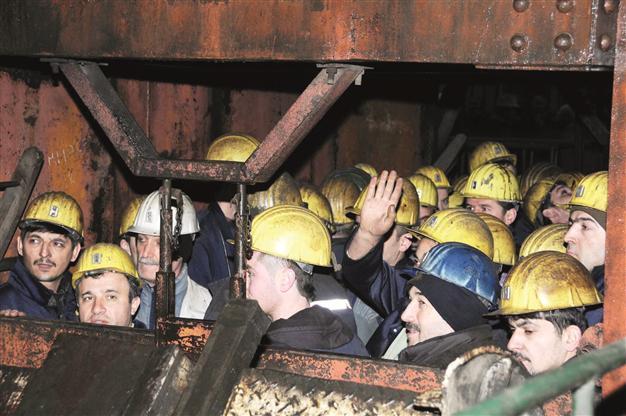Turkey’s mining capital hit by layoffs, migration
Erdinç Çelikkan ZONGULDAK

Miners crowd into an elevator in a coal mine in the Black Sea province of Zonguldak. A new law, which trade unions have long demanded, limits weekly working hours for miners to 30, reduced from 48 previously. DHA photo
Zonguldak, the heart of coal mining in Turkey, is facing hard days and emigration due to the lay-off of 4,000 miners after Parliament adopted a new code to improve safety conditions.
At least 22 mines have already been closed in the city of 110,000, home for around 15,000 miners. In addition to those who were fired, many others have been sent on compulsory vacation.
Not only workers, but bosses, local administrators and even shop owners are upset by the rapid developments.
Hüseyin Aşkar, the owner of the Yıldız Madencilik mining company, said the workers were now demanding work for longer hours under the same conditions in a bid to not to lose their jobs. He also asked for a state guarantee of purchase for the output.
“We have been in a deficit for the past five or six years and we will go bankrupt after the new code,” he said, adding that the regulation would increase costs by 50 percent.
A basic complaint of the mine owners is the royalty they pay to the Turkish Coal Institute (TTK) for their licenses to run the mines. Many say they would pay miners more if the fee was reduced or canceled.
A laid-off miner from Bahadır Madencilik, who preferred to remain anonymous, said “the situation is very bad if even such a strong company is being closed.”
“No work tomorrow, they told us, without any reasons,” he said, noting that he was now waiting for a call-back from the company.
“If the mines are totally closed, then migration will begin,” he said. “How can I find work on the soil and retire?”
A total of 301 coalminers were killed in a disaster in the western town of Soma on May 13, the worst mining accident in Turkey’s history, which brought the conditions at mines across Turkey under the spotlight. An omnibus bill, which included the regulations about the mining industry, was approved by President Recep Tayyip Erdoğan Sept. 12.
Mehmet Torun, the head of the Mining Engineers Chamber in Zonguldak, said the closures would lead to an increase in imported coal, as he also predicted that more mines would be shut down, highlighting the imbalance between the prices and costs.
“If the state would spend 10 percent of the $4 billion to $5 billion paid for imported coal on incentives, then it could push the industry for work safety investments,” he said. “Thus, they could both invest in safety and keep the business.”
Şükran Kırömeroğlu, a work health and safety specialist, also underlined that the mines in Zonguldak were not as profitable as those in Soma.
“I believe there will be more layoffs and the economy in the city will drop. The risks in mines are already high. A fear of losing jobs adds to this. Hundreds of miners are now moving to Soma, where the conditions are better,” he said.
She also highlighted that there were many illegal mines in Zonguldak, estimating the figure at around 2,000. “Children, women, all of the family members work at these mines,” she said.
Someone punishing ZonguldakThe Chamber of Merchants and Craftsmen in Zonguldak has 14,500 members. Muharrem Coşkun, head of the chamber, told daily Hürriyet that the contribution of the miners to the local economy stands at around 70 million Turkish Liras per month, and this would probably vanish after the chaos triggered by the new code.
“The money from the mines with the royalty system keeps us alive. And this does not exist now,” he said. “Migration will become faster after the code. The markets were already still. Take a look on the streets now and you will see no one smiling.”
Eyüp Alabaş, the head of the Genel Maden İşçileri trade union, also warned about migration and a risk of separating families. “Mining is the only profession that the people of Zonguldak know,” he said.
All parties would be affected by the closures, Mayor Muharrem Akdemir said, as he called on the state to find a “balance.” According to the mayor, the balance between the firms and workers has also changed as the jobs were now scarce.
“Once, 55,000 miners used to work in Zonguldak,” he said, adding the number now is below 15,000.
“A political reason lies beneath this,” he said. “Someone is punishing Zonguldak.”
